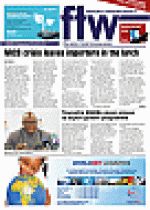The Zimbabwe Revenue
Authority (Zimra) has urged
government to consider
banning long-haul roadfreight
as it causes congestion at border
posts and damages the road
network.
Zimra’s Robert Mangwiro,
speaking on behalf of actingcommissioner-
general Happias
Kuzvinzwa, told the Chronicle
newspaper that, despite the
introduction of one-stop border
posts (OSBPs), long queues
of haulage trucks were still
common.
He added that it would
also be critical in boosting the
role of the National Railways
of Zimbabwe
(NRZ), giving
it significant
business.
Chairman
of the
parliamentary
portfolio
committee
on transport,
Dexter Nduna,
agreed.
And
transport and
infrastructural development
minister, Joram Gumbo, had
already hinted at plans to
ban heavy haulage. He said in
July that a legal instrument
was being created to ban the
transport of bulk goods by
road to protect the country’s
road network and boost NRZ’s
operations.
So the overall motivation
behind this proposed new
restriction would appear to
be the same as that already
monotonous chant from the
SA government – forcing goods
from road to rail.
To get a reaction from an
authoritative source on this
new wonder-tool being devised
in Zimbabwe, FTW questioned
Mike Fitzmaurice, CEO of
the Federation of Eastern
and Southern African Road
Transport
Associations
(Fesarta).
First,
he made it
clear that his
viewpoints
were based on
his personal
experiences and
knowledge of
the region – and
not necessarily
the standpoint of Fesarta.
“But, in my opinion, this
is nothing more than the
utterances of a failing and
dysfunctional government
similar to what is currently
happening in SA with our
current political regime,” he
said.
He also pointed out that, in
general, when governments in
Africa were threatened with
losing their grip on power, they
tended to make bold statements
in the wrong directions to take
the attention off themselves
and what were really their own
shortcomings and failings.
Currently, heavy goods
vehicles (HGVs) transport or
move more than 90% of cargo
in and out of Zimbabwe, and
by transit to other landlocked
countries in southern Africa
such as Zambia, DRC and
Malawi.
“The implications of moving
this to rail are just not practical
or affordable in southern Africa
as a whole,” said Fitzmaurice.
“The cost of upgrading NRZ in
isolation would run into billions
of US dollars in upgrading the
rail network, purchasing new
locomotives and sufficient
rolling stock to replace the
capacity of road transport
and, of course, a project of this
nature would take a decade or
more to become reality.
“I do not believe any major
global powerhouse – not even
China – would undertake a
foreign direct investment of
this nature given the current
political climate in Zimbabwe.”
And Fitzmaurice rejected
the concept of upgrading just
Zimbabwe’s rail network in
isolation.
“Because Zimbabwe is a
landlocked country and they
are reliant on ports for imports
and exports,” he told FTW,
“you would have to upgrade
the entire regional rail network
from origin (ports) to final
destination to make this
work efficiently. This means
not only Zimbabwe but all
countries linked to Zimbabwe
through which cargo is moved.
Therefore, it would have a
knock-on effect in the region.”
Read the full article on FTW
Online.
INSERT & CAPTION
The cost of upgrading
NRZ in isolation
would run into
billions of US dollars.
– Mike Fitzmaurice
CAPTION
Lining up at Malaba.
Zimra calls for ban on long-haul roadfreight
30 Sep 2016 - by Alan Peat
0 Comments
FTW - 30 Sep 2016

30 Sep 2016
30 Sep 2016
30 Sep 2016
30 Sep 2016
30 Sep 2016
30 Sep 2016
30 Sep 2016
30 Sep 2016
30 Sep 2016
